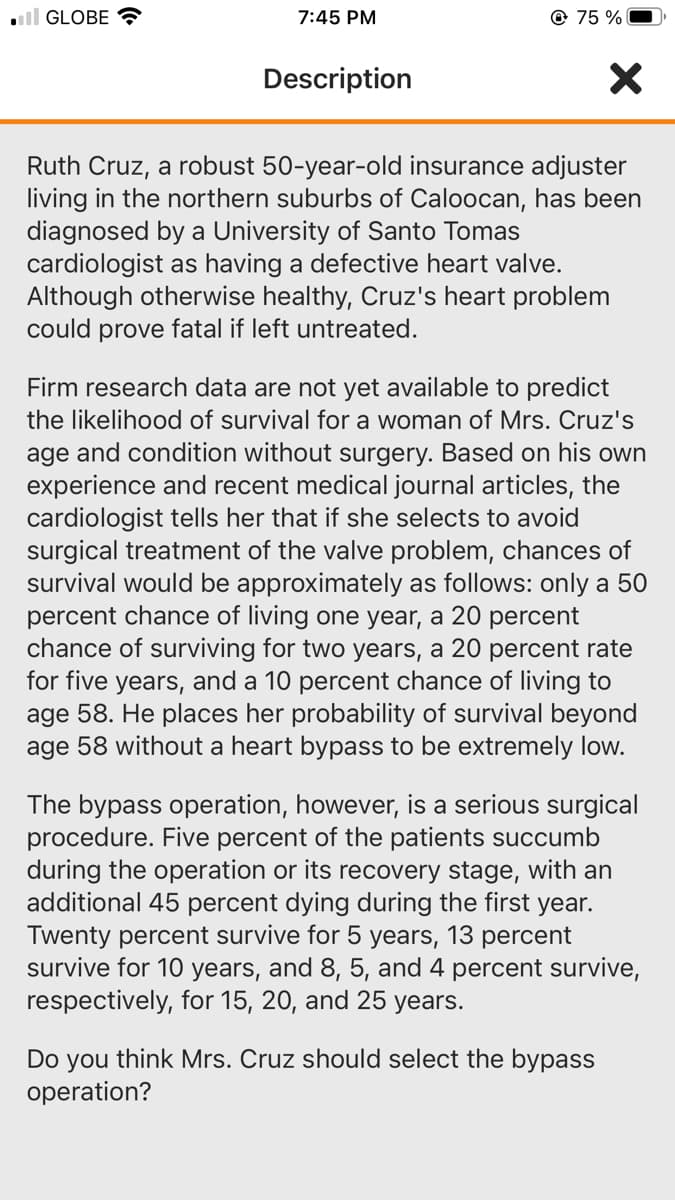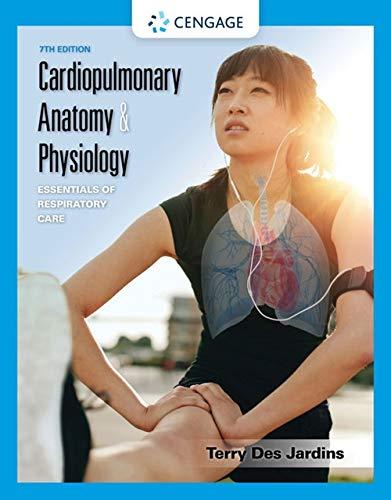Ruth Cruz, a robust 50-year-old insurance adjuster living in the northern suburbs of Caloocan, has been diagnosed by a University of Santo Tomas cardiologist as having a defective heart valve. Although otherwise healthy, Cruz's heart problem could prove fatal if left untreated. Firm research data are not yet available to predict the likelihood of survival for a woman of Mrs. Cruz's age and condition without surgery. Based on his own experience and recent medical journal articles, the cardiologist tells her that if she selects to avoid surgical treatment of the valve problem, chances of survival would be approximately as follows: only a 50 percent chance of living one year, a 20 percent chance of surviving for two years, a 20 percent rate for five years, and a 10 percent chance of living to age 58. He places her probability of survival beyond age 58 without a heart bypass to be extremely low. The bypass operation, however, is a serious surgical procedure. Five percent of the patients succumb during the operation or its recovery stage, with an additional 45 percent dying during the first year. Twenty percent survive for 5 years, 13 percent survive for 10 years, and 8, 5, and 4 percent survive, respectively, for 15, 20, and 25 years. Do you think Mrs. Cruz should select the bypass operation?
Ruth Cruz, a robust 50-year-old insurance adjuster living in the northern suburbs of Caloocan, has been diagnosed by a University of Santo Tomas cardiologist as having a defective heart valve. Although otherwise healthy, Cruz's heart problem could prove fatal if left untreated. Firm research data are not yet available to predict the likelihood of survival for a woman of Mrs. Cruz's age and condition without surgery. Based on his own experience and recent medical journal articles, the cardiologist tells her that if she selects to avoid surgical treatment of the valve problem, chances of survival would be approximately as follows: only a 50 percent chance of living one year, a 20 percent chance of surviving for two years, a 20 percent rate for five years, and a 10 percent chance of living to age 58. He places her probability of survival beyond age 58 without a heart bypass to be extremely low. The bypass operation, however, is a serious surgical procedure. Five percent of the patients succumb during the operation or its recovery stage, with an additional 45 percent dying during the first year. Twenty percent survive for 5 years, 13 percent survive for 10 years, and 8, 5, and 4 percent survive, respectively, for 15, 20, and 25 years. Do you think Mrs. Cruz should select the bypass operation?
Anatomy & Physiology
1st Edition
ISBN:9781938168130
Author:Kelly A. Young, James A. Wise, Peter DeSaix, Dean H. Kruse, Brandon Poe, Eddie Johnson, Jody E. Johnson, Oksana Korol, J. Gordon Betts, Mark Womble
Publisher:Kelly A. Young, James A. Wise, Peter DeSaix, Dean H. Kruse, Brandon Poe, Eddie Johnson, Jody E. Johnson, Oksana Korol, J. Gordon Betts, Mark Womble
Chapter22: The Respiratory System
Section: Chapter Questions
Problem 33RQ: If a baby is bom prematurely before type II cells produce sufficient pulmonary surfactant, which of...
Related questions
Question
Kindly send a complete solution so that I can deeply understand the answer to this question. Thank you!

Transcribed Image Text:ll GLOBE ?
7:45 PM
@ 75 %
Description
Ruth Cruz, a robust 50-year-old insurance adjuster
living in the northern suburbs of Caloocan, has been
diagnosed by a University of Santo Tomas
cardiologist as having a defective heart valve.
Although otherwise healthy, Cruz's heart problem
could prove fatal if left untreated.
Firm research data are not yet available to predict
the likelihood of survival for a woman of Mrs. Cruz's
age and condition without surgery. Based on his own
experience and recent medical journal articles, the
cardiologist tells her that if she selects to avoid
surgical treatment of the valve problem, chances of
survival would be approximately as follows: only a 50
percent chance of living one year, a 20 percent
chance of surviving for two years, a 20 percent rate
for five years, and a 10 percent chance of living to
age 58. He places her probability of survival beyond
age 58 without a heart bypass to be extremely low.
The bypass operation, however, is a serious surgical
procedure. Five percent of the patients succumb
during the operation or its recovery stage, with an
additional 45 percent dying during the first year.
Twenty percent survive for 5 years, 13 percent
survive for 10 years, and 8, 5, and 4 percent survive,
respectively, for 15, 20, and 25 years.
Do you think Mrs. Cruz should select the bypass
operation?
Expert Solution
This question has been solved!
Explore an expertly crafted, step-by-step solution for a thorough understanding of key concepts.
This is a popular solution!
Trending now
This is a popular solution!
Step by step
Solved in 4 steps

Recommended textbooks for you

Anatomy & Physiology
Biology
ISBN:
9781938168130
Author:
Kelly A. Young, James A. Wise, Peter DeSaix, Dean H. Kruse, Brandon Poe, Eddie Johnson, Jody E. Johnson, Oksana Korol, J. Gordon Betts, Mark Womble
Publisher:
OpenStax College

Cardiopulmonary Anatomy & Physiology
Biology
ISBN:
9781337794909
Author:
Des Jardins, Terry.
Publisher:
Cengage Learning,

Case Studies In Health Information Management
Biology
ISBN:
9781337676908
Author:
SCHNERING
Publisher:
Cengage

Anatomy & Physiology
Biology
ISBN:
9781938168130
Author:
Kelly A. Young, James A. Wise, Peter DeSaix, Dean H. Kruse, Brandon Poe, Eddie Johnson, Jody E. Johnson, Oksana Korol, J. Gordon Betts, Mark Womble
Publisher:
OpenStax College

Cardiopulmonary Anatomy & Physiology
Biology
ISBN:
9781337794909
Author:
Des Jardins, Terry.
Publisher:
Cengage Learning,

Case Studies In Health Information Management
Biology
ISBN:
9781337676908
Author:
SCHNERING
Publisher:
Cengage